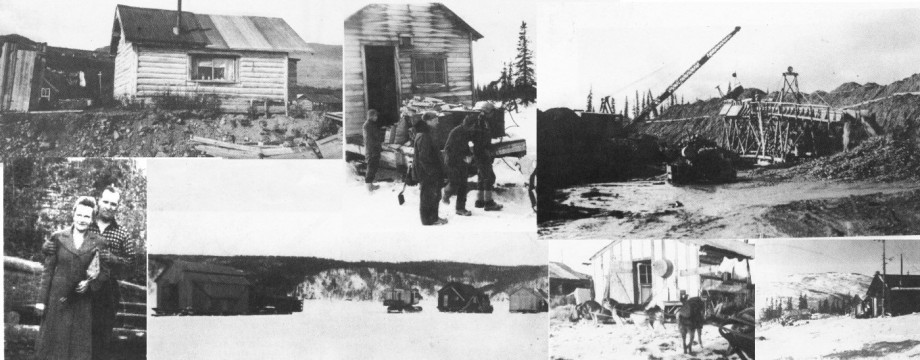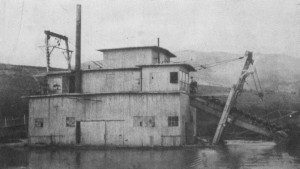Trials and Tribulations
The weather and scarcity of inhabitants made living hazardous in the north country. A man mined all alone on a creek eight miles from Flat, ground sluicing (washing away the top soil) with water pressure. Part of the deep muck was solid frozen permafrost. A huge chunk, weighing several tons, broke loose from the high bank behind him as he stood there. It landed on his leg. I was told that he had been pinned there for three days in the rain, with millions of mosquitos working on him. Finally someone from Flat had gone to visit him. The leg was amputated at the Holy Cross Hospital in Holy Cross, Alaska, and replaced with a wooden leg which he handled well.
Another time a friend found an unfortunate trapper’s cabin burned down. The trapper was found several miles toward Flat, clad only in his underwear, frozen to death in a sitting position against a tree. Because his knees were bent, they had to cut his legs off to get the cover onto the pine box in which he was buried.
Once during the summer of 1929 Gus came from Iditarod with a heavy truck‑load of groceries. His brakes had quit working and he wanted to unload into the store before I fixed them. A slight incline led down to the front of the store.
I backed the truck down several times to show Gus how to stop it by having it in reverse gear and turning off the switch. He wanted to learn how to do it if the brakes failed again. He backed down but panicked, and instead of turning off the switch, he stomped on the throttle. The truck lurched over the board sidewalk and ended up with the rear end in the store through the big plate glass window. Harry Donnelley came running out, cussing Gus.
Gus was really shook up and kept yelling, “I pay, I pay! A new window was ordered from Seattle. It came on the last boat of the season so the hole was covered all summer with plywood.
Alex had a habit of coming aboard the dredge every morning at seven and sitting on a wooden bench in the winch room to watch Harry Steen do the winching. Harry was the dredge master and operated the winches each morning from seven to eleven, when the day winch man came to put in his ten hours.
It got on Harry’s nerves to have the boss sitting there watching. So one day he and the chief engineer drove small nails barely through the bench. They wired the heads of the nails together under the bench, running wires to a hotshot battery in the next room, with more wires under the floor to one of the winch levers. The next morning Alex came and sat on the right spot. I seldom went into the winch room when he was there but that morning I made an excuse to go and ask Harry something. As soon as I went in Harry pushed the lever.
Alex jumped up and yelled, “Owwww!” Grabbing his rear with both hands he hollered, “God damn! Just like electricity went all through me!” Harry calmly remarked, “What are you talking about? There’s no electricity in that wooden bench. Sit down!”
“I’m not crazy. I know it was electricity!”
After he calmed down on the bench Harcry gave him another jolt. This time he swore, “What the hell!” and looked under the bench. He was the maddest, cussingest man we ever saw as he stalked out of the winch room and he never came to sit there again while Harry was winching.
We stopped the dredge about every fourteenth day, cleanup day, to take the gold out of the boxes. First we took all the steel wedged pieces, called riffles, out from under the sand and gravel, and washed them with garden hoses. Then we shoveled all of the sand, gravel and gold mixture into a pile at the upper end of the sluice box. We were all in the box with rubber boots on. When enough water was turned in to float the sand and gravel out of the box, we began mixing as fast as we could with square point shovels, to separate the gold from the gravel. The gold, being so much heavier, formed in little piles at the bottom of the box.
Alex never told us how much the cleanups were but we could see he was making money. Several times five, ten and twenty dollar gold pieces that people had lost were found in the cleanups. Alex told us finders were keepers. I was lucky and found a twenty once.
Later in the fall of 1929 Alex gave Gus a contract to move all the ‑buildings in town, for the ground under them was rich. My oiler partner and I took the job of jacking up all the buildings and putting sleds under
them. Gus moved them onto dredge tailings that had been leveled.
This job lasted until February so I looked around for something to ‑do. Dan Dukich, one of the old timers, said he had a small log cabin with ‑lots of wood around it twelve miles up Otter creek. Charlie Salmi took me and my groceries there with twelve dogs.
Gus said he would pay me twelve dollars a cord and would come to get ‑the first load in about a month. After cutting and piling a cord every ‑day for fourteen days I decided to go to Flat because I did not feel well and was constipated. Too much French toast, French toast. I liked it with Log Cabin syrup.
I hadn’t taken show shoes, intending to ride back with Gus. I started out at daylight finding it had snowed a lot and the trail was hard to see. Daytime thawing and night freezing made a frozen crust. I broke down every few steps, going down to my hips, but keeping at it got me to Flat late that night in the dark. I learned later that I could have woven a pair of small round snowshoes, called bearpaws, out of willows, and somehow fastened them to my feet.
When I walked into Aunt Aina’s that night she exclaimed in amazement, “What happened to you? You have really lost weight.” A better diet remedied that, but I did not return to cut any more wood. It was nearly time to start overhauling the dredge anyway.
Frank Dorbandt came to Flat often as did bush pilots, Oscar Winchell, Ben Eielson, Matt Nieminen, Noel Wien, Merle “Sas” Sasseen and Johnnie Moore, to name a few. They brought in perishable groceries and other supplies from Fairbanks and Anchorage.
Each time a plane flew in, anyone who could rushed to the airfield to see who and what had come in. Airfreight was very expensive. For instance, Aina ordered six bananas from Fairbanks for three dollars. A quarter or two bits was the smallest change used those days in the interior villages, although in Anchorage and Fairbanks they used nickels and dimes.
We went to work repairing the dredge for another season. About the fifteenth of May we started the digging for another six months.
In the latter part of June we dug up the old townsite from which we had moved the buildings. I am sure Alex regretted that he said finders are keepers because so many gold coins were found in the cleanups.
During summer evenings of 1930 I made trips to Iditarod with Gus’s truck after supplies. Gus and Aina went back east to visit my folks and other relatives.
Late in the fall on one trip, as I was about to leave Iditarod, a young Indian woman staggered drunkenly into the warehouse and said she wanted a ride to Flat. “Get in the truck,” I told her. As soon as I started up the engine she began trying to put her arms around me. I had to drive the truck with one hand and keep pushing her away with the other, telling her to stay on her own side of the seat. But she was so drunk that she didn’t pay any attention. It was a long eight miles. Besides my problems in the cab, the road was slippery. About a mile from Flat I came to a small culvert that had filled with ice. Water had formed a glacier over the ice and across the road. Just as I eased the truck on to it, the girl made another lunge at me. We were nearly in Flat so I guess she was getting desperate. I lost control of the truck and it slid sideways off the road, dropping a rear wheel into a hole.
It was stuck and I was furious. I told the girl to get out and start walking. Without saying a word she began staggering toward Flat. Evidently she made it, because I did not see her anywhere on the road after I finally got going.
One of the women in town had been suffering with pain in her side for quite a while and one night she became very sick. They wired for Noel Wien to come take her to the hospital in Fairbanks. It was just before midnight, and late enough in the season so it was quite dark, when he came with his Hamilton all metal monoplane. Our dredge was working close enough to the field so we could watch his landing attempts. He tried several times but could not judge his distance above the ground so did not dare stall out for a landing. Planes did not have landing lights yet. He finally disappeared over the hill to the north. They took the sick woman up to the old landing strip where he was waiting. The hilltop still had enough twilight to see to land. The woman’s appendix had burst, and Noel’s daring efforts saved her life.
Years before, I was told, a man named Jim Fullerton wasn’t so lucky. With no airplanes yet, he died of a ruptured appendix in a dog sled enroot to Fairbanks. He had a wife and two young sons in Flat.
One morning just before daylight we spotted something red in front of one of the line girls’ cabins. It started to crawl toward the dredge. When I had to go ashore to move one of the cable blocks ahead, I saw it was the Indian woman, Maggie, crawling on her hands and knees, screaming and crying. She begged me to help her to her house about a hundred feet away, saying, “They threw me out and broke my leg.” She was fat and quite drunk. I stood her up on her good leg, put my arms around her from behind, lifting her up, half carrying her.
Scotty and Paul, watching from the dredge, didn’t help matters any by laughing and whistling, thinking that I was carrying a drunken woman home. They didn’t believe her leg was broken and I got a razzing in the restaurant the next morning. Maggie spent months in the Holy Cross Hospital but her leg was saved. Her husband had left her with five children and never came back. She took in washing and did the best she could to make a living.
We had our little fun on the dredge. The second engineer was a young fellow from Germany who came to work with his dad in a small gold mining operation. But being very good on Diesel engines, he went to work for Mathieson instead. During our every two weeks on night shift he lay down 5 on the engine room work bench for several hours after our midnight lunch, and slept soundly. One night the boiler fireman and I looked through a knothole behind the boiler, and saw that he was sleeping. I tied his leg to the vise, took a hammer and started a rhythmic pounding on the back side of the engine. He leaped off the bench, standing there grinning foolishly, with one leg on the floor and the other tied to the vise. When I kept right on pounding, he desperately began untying his leg. Just before he shut the engine down I came from behind it. He laughed, saying he was sure the boss was on board and that a connecting rod was knocking. His first thoughts were of a trip back to Germany.
The next night as I pushed open the sliding door into the engine room, I got a bucket of ice cold water down my neck. He had rigged it above the door.



